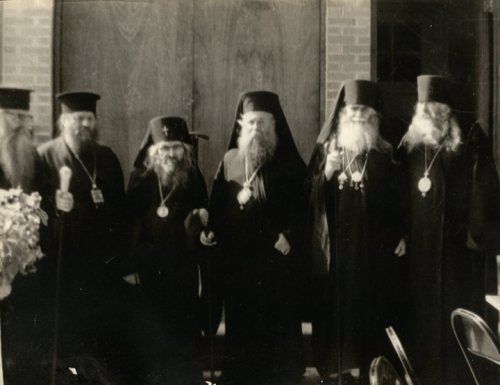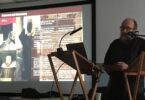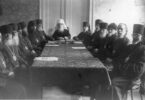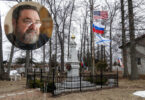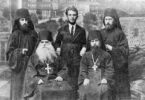The Greek “Old Calendarist” movement took shape after the Church of Greece adopted the Gregorian Calendar in 1924 for the immovable church feasts. In 1960, the ROCOR Synod refused to ordain Archimandrite Akakios (Pappas) for the so-called Florinate Synod of the Greek True Orthodox Church. This consecration was then performed, without the ROCOR Synod’s knowledge, by Bishops Seraphim (Ivanov) of Chicago and Theophilus (Ionescu) of Sèvres. Despite the fact that, after the consecration, the ROCOR Synod ordered its bishops to refrain from meddling in the affairs of the Greek Orthodox Church, Archbishop Leonty (Filippovich) of Chile and Peru consecrated four more bishops in Athens together with Bishop Akakios in May 1962. Bishop Nathanael’s memorandum to the conference of ROCOR bishops in Europe is a response to this event. The members of this conference included Archbishop John (Maximovich) of Brussels and Western Europe (canonized in 1994). At the meeting of the 1962 ROCOR Council of Bishops, Archbishop Leonty’s actions were supported by Archbishop Averky (Taushev) of Holy Trinity Monastery and Syracuse and Saint John of Shanghai and San Francisco. At the Council, Archbishop Leonty received a reprimand for his actions and his ordinations of clergy in Greece were deemed invalid (this decision was revoked in 1969).
After this council, in November 1962, Archbishop Leonty, together with Bishop Seraphim (Svezhevskii) of Venezuela, consecrated Bishop Peter of Astoria (Astyfidis) for the Old Calendarist Greeks in North America. Bishop Nathanael’s memorandum was drawn up in 1974, ten years after the election of Metropolitan Philaret. In 1969, the ROCOR recognized the consecrations for Greek Old Calendarists performed by the bishops of the ROCOR. Then in 1971, at the Holy Transfiguration Monastery in Brookline, MA Bishop Philotheus (Narko) of Hamburg and Constantine (Essensky) of Brisbane performed correcting imposition of hands (χειροθεσία) over Bishop Kallistos of Matthewite’s Synod. Bishop Nathanael reflected on this event in his memorandum submitted to the conference of ROCOR’s European bishops of which, Bishop Philotheus was a member.
The text here is reproduced from the edition Archbishop Nathanael, Besedy o sviashchennom pisanii i o vere i tserkvi, [Talks on Sacred Scripture, Faith, and the Church. Published by the Russian Orthodox Youth Committee], New York, vol.5, 1995. This translation has been made possible by a grant from the American Russian Aid Association – Otrada, Inc.
Deacon Andrei Psarev, March 27, 2021
The basis for the canonical structure of the Orthodox Church, as is well known, is the 34th Canon of the Holy Apostles. This Canon is universally known.
Unlike the Latin Church of the West, in which the whole plenitude of supreme authority over the Church is entrusted to the Primate, the Pope of Rome, the Orthodox Church has remained faithful to this God-inspired Canon.
At first glance, it might seem as if the Church renounced this principle when the Second Ecumenical Synod entrusted individual bishops – first and foremost Saint Gregory of Nyssa, but also Amphilochius of Iconium, Diodore of Tarsus, Timothy of Alexandria, and others – with full authority to decide on matters of dogma, by decreeing that “all those who will not enter into communion with aforesaid bishops shall be excommunicated as outright heretics”. Ambrose disagreed with this decision at the Council of Aquileia, yet it remained the decree of the God-inspired Synod.
In actual fact, there is no contradiction here, and certainly not with the spirit of the Apostolic Canon. It was perfectly clear to the Holy Ecumenical Synod that Saint Gregory of Nyssa and the hierarchs listed here completely and perfectly expressed the faith of all the Orthodox bishops, and therefore that being in agreement with them was a guarantor of Orthodoxy for all the other bishops whose right faith had yet to be checked.
Our Russian Church Abroad had the joyous experience of being headed at the moment of its foundation by a hierarch who, in terms of the fullness of his gifts of grace, can be ranked – not without reason – among the most gracious hierarchs of old. This hierarch was Metropolitan Antony, a father of fathers and teacher of teachers, of whom not only we, but also representatives of other Local Churches, spoke of as being a leader of the Orthodox Church.
This was clearly and unequivocally stated by the locum tenens of the Patriarch of Constantinople, by the Patriarch of Alexandria, and especially forcefully by the Patriarch of Serbia:
“Among your number is Metropolitan Antony,” His Holiness Patriarch Varnava said. “He is a great hierarch and an adornment to the Universal Church. He has a lofty mind similar to that of the first hierarchs of the Church of Christ in the early days of Christianity. The truth about the Church is contained in him…”
It is only natural that, which such a head, the episcopate of the Church Abroad – which consisted anyway mostly of disciples or disciples of this great hierarch – willingly surrendered all of their rights to him and submitted to his leadership without any questions or corrections, for they knew that Metropolitan Antony personified the will and the conscience of the entire episcopate of the Church Abroad.
This fullness was somewhat reduced, yet did not disappear, when Metropolitan Antony’s successor, Metropolitan Anastasy, became First Hierarch. The main elements of it remained as before: Metropolitan Anastasy was the most senior hierarch in the diaspora in terms of both the date of his consecration and his age.
He had, over the course of a number of years, been Metropolitan Antony’s direct assistant, unquestioned deputy, and successor. Over the 30 years that he stood at the helm of the Church Abroad, he consecrated all the existing bishops of the Church Abroad, whether directly or through those whom he had ordained.
Our episcopate was thus almost as it was under Metropolitan Antony, submitting to Metropolitan Anastasy’s leadership with barely any questions or attempts at correction.
This situation changed radically 10 years ago, when, through the clear and unchanging instruction of the Holy Spirit, the current Head of our Church, Metropolitan Philaret, was elected First Hierarch. At the time, he was not the most senior but rather the most junior hierarch of the Church Abroad by the date of consecration.
Both the election of Metropolitan Philaret and the consequences of this act were part of God’s pedagogical plan for our episcopate.
However substantive or undisputed the reasons may have been that led the episcopate of the Church Abroad to give up their right to participate in church governance in favor of Metropolitan Antony and, only slightly less categorically, of Metropolitan Anastasy – and however pleasing this state of affairs may have been – it was not natural for a Church structured along Orthodox lines.
The Orthodox Church requires all of Her children, and bishops to an infinitely greater degree, to live Her life and to take part in the discussion of any and all issues that come up in Her midst, such that not a single one of the same should remain foreign to Her archpastors.
The pain of the Church should be echoed by pain in the hearts of Her archpastors; Her joy should be reflected in joy in all Orthodox souls.
The entire episcopate of the Church should be pervaded by a common, conciliar life.
This necessitates a certain spiritual effort. An archpastor ought not to confine himself to the interests of his own diocese, but be interested in and live for the interests of the entire Church. Thoughts like, “This does not affect me, let the Metropolitan decide himself,” are not permissible.
The Holy Spirit demands of us: “The Bishops must acknowledge him who is first among them, and do nothing of consequence without his consent … But neither let him who is the first do anything without the consent of all” (Apostolic Canon 34).
We need to have more intensive interaction between our hierarchs and the First Hierarch, as well as among our hierarchs. When a problem requiring a conciliar solution comes up in some diocese or another, all the bishops who are called to proclaim their conciliar will need to be informed as fully as possible about the details of such problems as they arise.
What is important is not the manner in which the bishops are asked and what responses they give, but rather the essence of the matter.
We are confronted with the highly edifying example of Patriarch Tikhon’s conciliarism.
After the God-hating regime deprived him of any means of communication with the episcopate of the Russian Church, he nevertheless did not renounce the principle of the 34th Apostolic Canon and assume unilateral authority, but solicited the opinion of other archpastors, both free and imprisoned, by any means possible: by private letters, through people who could meet an individual bishop and speak with him about a given topic, etc.
Implementing this kind of conciliarism in our Church Abroad will require the spiritual effort of us. I imagine that not only any meetings of a particular bishop with our First Hierarch, but also meetings of two or three bishops among themselves, might to some, tiny extent be small Councils of Bishops at which preliminary responses to particular issues within our Church might be worked out.
* * *
We are now faced with a question which, in its current form, arose not long ago, but the roots of which go back quite a ways. It has to be thought through, prayed over, and resolved in a conciliar manner by all the Orthodox Russian hierarchs in the diaspora.
Before us, we have a respectful, I daresay even lovingly reverent, yet scolding letter from Subdeacon G. K. of the Church of Greece. He accuses our church of meddling in the internal affairs of the Local Church of Greece by consecrating Old Calendarist bishops.
This letter is addressed to the Eastern Patriarchs and our First Hierarch. It is fraught with real danger for our Church. For 30 years, our Church Abroad has faced the threat of being anathematized by all the Local Orthodox Churches.
This is something that the Moscow Patriarchate, and the Soviet regime that is behind it, are working hard to achieve. Consequently, this is something that is harmful to the Church, since we know a priori that everything that the Soviet regime seeks to achieve is harmful to the Church.
Accordingly, we must seek to prevent our Church from being anathematized.
As long as it is a question of our being anathematized due to our refusal to submit to the Patriarch of Moscow and to sign a declaration of loyalty to the Soviet regime, we do not have to worry. The wrongness of this accusation is too evident to anyone with a conscience, and among the Eastern hierarchs, there are many who remember with dread that a wrongly invoked anathema rebounds upon him who invoked it.
Most important of all, apart from these more or less practical considerations, we recall the words of the Apostle Peter: “But and if ye suffer for righteousness sake, happy are ye: and be not afraid of their terror, neither be troubled” (I Peter 3:14). Yet the Apostle warns: “If ye be reproached for the name of Christ, happy are ye […] But let none of you suffer as […] as a busybody in other men’s matters” (I Peter 4:14–15).
In the letter under examination, we are accused of actual sin: of meddling in the internal affairs of another Local Church, and there is an element of correctness in this charge.
The canons of the Church strictly forbid one Local Church from meddling in the internal affairs of another. The only exception is if some Local Church or another should fall into heresy.
In that case, after gathering at a Council and discussing the situation, the other Churches cut this Local Church off from communion with them as if being infected with a deadly poison. This was how it was in ancient times when the Church of the non-Byzantine East was infected with the heresy of Nestorianism, and the Church of Egypt and isolated dioceses in Syria with that of Monophysitism.
Essentially the same action, albeit without observing all the formalities and over a protracted period of several centuries, was taken with respect to the Church of the West when it proclaimed the heresy of the filioque and Papal Primacy.
Yet no-one has proclaimed the Church of Greece to have fallen into heresy. Yes, it has introduced the undesirable New Calendar for the immovable feasts. Yet not one authoritative body in the Orthodox Church has proclaimed the Gregorian Calendar to be a heresy, especially if the Paschalia is left untouched.
The Church of Russia came close to introducing the Gregorian Calendar at various points.
The issue was raised under the Emperors Peter the Great and Paul I, and at the turn of this [i.e., the 20th —trans.] century the question was brought up for discussion by the Pre-conciliar Commission.
It did not occur to anybody to resolve this question merely by referring to the New Calendar as being a heresy.
In 1906, the Holy Synod was leaning towards introducing the New Calendar, but was stopped by the brilliant report of V. Bolotov, who demonstrated the imprecision of the Gregorian Calendar and the church-historical value of the Julian Calendar, which combines elements of the solar and lunar calendars.
Nevertheless, in June 1923, His Holiness Patriarch Tikhon issued a decree introducing the New Calendar in the Russian Church. Several days later, under the influence of information he had received about the stance of the episcopate on this matter, he withdrew this decree. Yet no-one accused him of heresy for this reason.
The great Russian martyr-bishop Hilarion said that changing the calendar is, in essence, just as unimportant as setting the clocks forward to summertime, as is done in many countries.
Nobody accused him of heresy.
Though this extreme view is, of course, incorrect. The New Calendar is harmful. It does not bring any spiritual benefit, but rather only sows confusion and division.
In addition, over the past decades, it has become an element of spiritually perilous ecclesiastical modernism. And yet in and of itself, it is not a heresy. This means that the introduction of the New Calendar in the Church of Greece does not justify the ROCOR hierarchy’s meddling in the internal affairs of the Church of Greece.
There is another circumstance that is important. In the fight between the proponents of the New and Old Calendars, after the New Calendarists had gained the upper hand, they persecuted the advocates of the Old Calendar, at times fiercely.
This cannot but arouse our most fervent and sincere feelings of sympathy for our suffering fellow brethren. We cannot remain indifferent here under the guise of non-interference. We have to express our love and our sympathy for the suffering adherents of the Old Calendar in Greece.
If outside persecution is not permissible in the Church even with respect to heretics, then this is all the more so with respect to fellow brethren belonging to the one body of the Church.
Our advocacy for the Old Calendarists before the hierarchy of the Church of Greece is made easier for us by the fact that, of all the Local Churches of the East, the Church of Greece is the least modernized and the most faithful to the Canons of the Church.
It was indeed specifically within the Church of Greece that our First Hierarch’s letter to the Patriarch of Constantinople about the necessity of observing the holy canons was translated and millions of copies of it were printed.
It seems to be that, in cases of necessity, one might consecrate priests and possibly even bishops for the Greek Old Calendarists, in order not to leave them without pastoral oversight, and under the non-negotiable condition that they are to transfer to our ecclesiastical jurisdiction.
Although the letter of the canons prevents us from doing this without the blessing of their Mother Church, under the circumstances at hand, where this transfer would take place due to a serious reason pertaining to the church rather than petty discontent with their archpastor or pastor, the spirit of the canons would not be infringed.
A historical analogy shall enable us to consider this problem in a sufficiently broad light.
How would the former Russian Church authorities have felt if, during the time of the formation of the Old Believer movement, another Local Church had taken it upon itself to consecrate bishops and priests for the Old Believers while giving them total freedom and allowing them to pronounce insolent blasphemies against their own Church?
At the same time, when individuals with Old Believer sympathies departed for Mount Athos, the church authorities did nothing to stop them.
Nobody condemned the righteous elder Paisius Velichkovsky, either, when he transferred from the jurisdiction of the Russian church to that of Constantinople without a special blessing due to his feeling oppressed by the dominance of Western Scholasticism in the ecclesiastical life of Petrine Russia.
Yet in all these cases, these individuals fully switched jurisdictions and submitted to the discipline of their new jurisdictions, rather than remaining without oversight or, as is often the case, as part of anarchist groups like some of the groups of Greek Old Calendarists that have been created with our involvement.
As with our Old Calendarists, their main sin is mutual enmity and bitterness against the New Calendar Church of Greece.
We would be able to combat all of this if the Greek bishops we had consecrated were in submission to our hierarchy.
Some examples from the life of our Church Abroad serve as good illustrations of this situation. We received the Greek Holy Transfiguration Monastery in Boston into our Church, and it has become one of the most valuable adornments of our Church, while keeping church discipline and remaining faithful to the canons of the Church.
At the same time, our hierarchs have consecrated several Greek Old Calendarist bishops while abandoning them to their own whims and not bringing them into our Church, and they have fragmented into warring splinter groups that have brought much confusion and temptation into church life in their own country.
Yet even the very act of consecrating them was, in its time, an anarchic one: it was performed without the blessing of our hierarchy and in spite of the explicit disapproval of then-First Hierarch Metropolitan Anastasy.
We have no information at present that would cause us to change our point of view on this. We must declare decisively that these consecrations, which were performed without authorization by individual hierarchs of our Church, do not have the approval of our Church as such.
We must call on the Greek hierarchs consecrated by our bishops to submit to our hierarchy and improve church discipline in their circles.
If we succeed in this, we will be able to bear full responsibility for the Old Calendarist communities in Greece, while seeing to it that they become centers of piety and strict observance of the canons, rather than exemplars of ecclesiastical anarchy and confusion.

